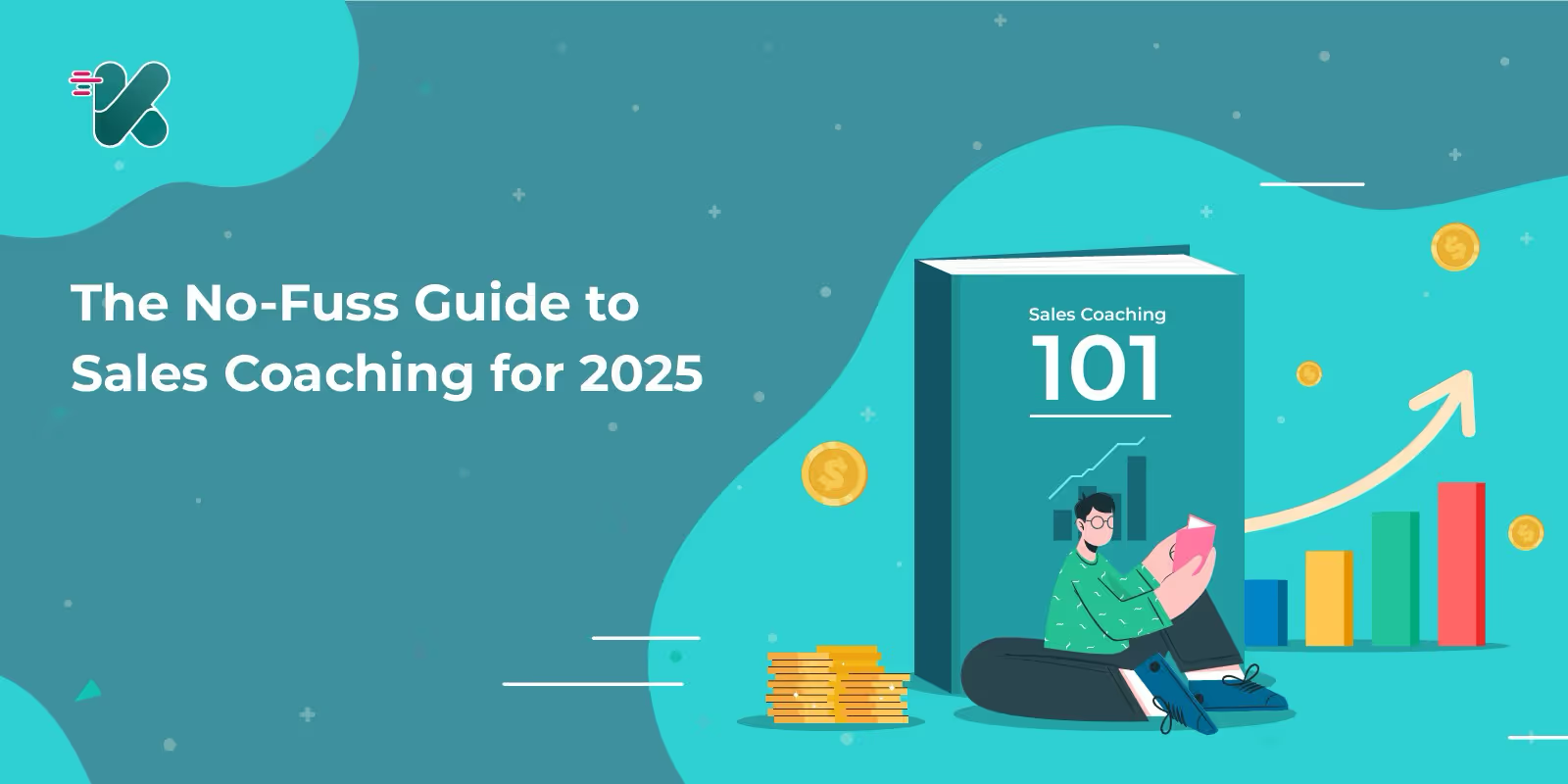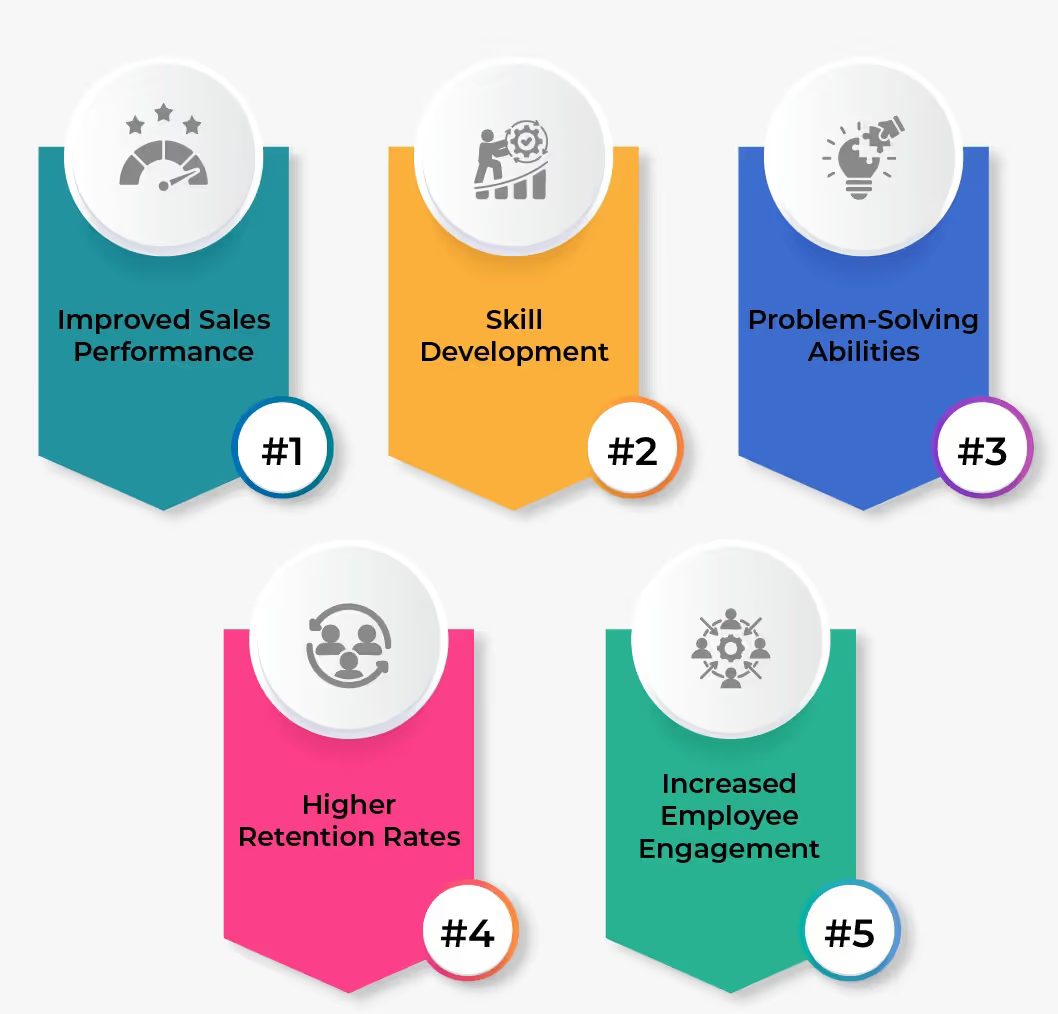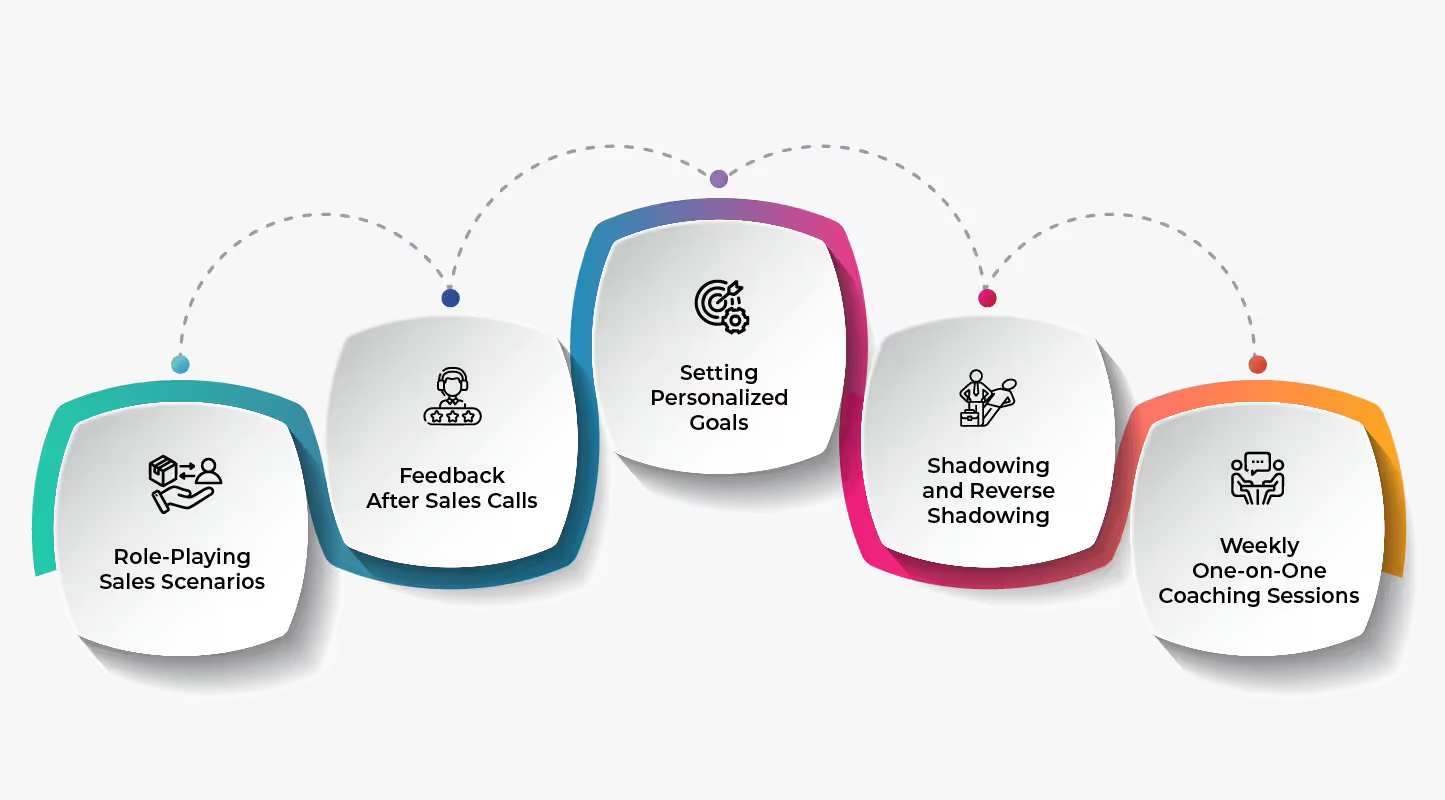
Blog
A No-Nonsense Approach to Sales Coaching in 2025
December 9, 2024


Key Insights
The No-Fuss Guide to Sales Coaching for 2025
Sometimes, it’s easy to think that your salespeople are fully equipped to crush their targets. After all, they’ve been trained, they’ve got the tools, and they know the game. But here’s the catch, being good doesn’t always mean being great. A seasoned team can still benefit from sales coaching that goes beyond the basics.
That’s because sales coaching isn’t just about teaching new skills; it’s about fine-tuning what’s already there, fostering growth, and keeping motivation high when the grind starts to wear on. In fact, even top performers can struggle without the right support.
Let’s explore why sales coaching matters more than ever in 2025, even for your most experienced salespeople.
What Is Sales Coaching?
Sales coaching is the process of developing a sales team by providing guidance, feedback, and structured support. It involves helping salespeople enhance their skills, overcome challenges, and fine-tune strategies to improve their performance. Unlike sales training, which focuses on imparting specific knowledge or skills, sales coaching is a more personalized, ongoing process aimed at improving performance through one-on-one guidance.
What Does a Sales Coach Do?
A sales coach wears many hats. They’re a mentor, an advisor, and a motivator all rolled into one. In short, a sales coach is the behind-the-scenes strategist who keeps the team on track for success, helping them grow not just in skill, but in confidence too.
- Assess Performance
A coach regularly evaluates team members' performance to identify strengths and areas for improvement.
- Set Goals
Coaches help set personalized, achievable goals for each salesperson to ensure they’re aiming for the right targets.
- Provide Feedback
Constructive feedback is key to improving performance. A coach ensures that salespeople know what they’re doing well and where they can improve.
- Train on Specific Skills
Whether it’s improving communication or closing techniques, a coach provides targeted advice on how to enhance specific skills.
- Encourage Motivation
A coach keeps the team motivated and focused, even during tough times.
Looking to inspire your sales team? Check out these motivational sales stories that will energize and drive them to success: 6 Uplifting Sales Success Stories to Boost Your Sales Motivation
The Power of Sales Coaching

When sales coaching is done right, it can have transformative effects on both individuals and the entire team. Here’s how:
1. Improved Sales Performance
A study by Salesforce found that teams with strong coaching achieve 17% higher win rates. Salespeople who receive ongoing coaching tend to meet their targets more consistently and close more deals. The reason? Coaching addresses both the skills and mindset needed to succeed.
2. Skill Development
Sales coaching goes beyond the basics. It helps develop advanced skills like negotiation, relationship-building, and active listening, which are vital for closing deals in competitive markets. Coaches help individuals understand their unique selling style and refine it.
3. Problem-Solving Abilities
Sales often involve tackling objections and overcoming hurdles. A coach helps salespeople think on their feet, guiding them through problem-solving strategies that can lead to better solutions for clients and a higher close rate.
4. Higher Retention Rates
A report from Gartner suggests that companies that provide regular coaching have 25% higher employee retention rates. Salespeople who feel supported and guided are less likely to seek opportunities elsewhere.
5. Increased Employee Engagement
According to Gallup, employees who receive regular feedback are 3.5 times more likely to be engaged in their work. Engaged employees are motivated, productive, and more likely to perform at their best.
Discover how professional sales coaching can drive exceptional results for your organization in our blog: Achieve Sales Excellence with Professional Sales Coaching.
Proven Sales Coaching Examples to Boost Your Team’s Performance

Sales coaching can take many forms, depending on your team’s needs. Here are a few examples of common sales coaching techniques:
- Role-Playing Sales Scenarios
This is a great way to practice real-life sales situations. It allows reps to rehearse different ways to handle objections or close deals in a low-pressure environment.
- Feedback After Sales Calls
Coaches can review sales calls, providing feedback on how the rep can improve their approach, from tone to closing techniques.
- Setting Personalized Goals
Instead of one-size-fits-all goals, a good coach helps salespeople set goals that align with their strengths and developmental needs.
- Shadowing and Reverse Shadowing
Shadowing more experienced salespeople gives reps valuable insights into successful techniques. Reverse shadowing, where the coach observes the rep in action, is also a powerful learning tool.
- Weekly One-on-One Coaching Sessions
Consistent, personalized coaching allows for tracking progress, addressing issues in real-time, and giving reps the tools they need to continuously improve.
Sales Coaching Best Practices: Techniques to Try in 2025

As we step into 2025, sales coaching strategies must evolve to match the changing landscape of sales. Here are some best practices to consider:
1. Gamify Coaching Goals
It’s crucial to regularly review and adjust coaching goals. Gamify—setting goals that are aligned with the salesperson's strengths, weaknesses, and overall team targets, ensures that coaching stays relevant and motivating.
2. Incorporate Reverse Mentoring
Reverse mentoring is when more junior salespeople coach senior reps. This can be an eye-opening experience for both parties, offering new perspectives and fostering a culture of learning.
3. Cross-Department Collaboration
Sales coaching shouldn’t happen in a silo. Encourage collaboration with other departments, such as marketing and customer service. This will provide salespeople with a holistic view of the customer journey and lead to more effective sales tactics.
4. Customer-Centric Coaching
Instead of focusing only on sales tactics, incorporate coaching that emphasizes understanding customer needs, improving customer relationships, and focusing on long-term value over short-term sales.
5. Celebrate Learning Over Perfection
One of the best ways to engage your team is by celebrating learning moments, not just results. Encourage your team to view mistakes as learning opportunities and emphasize growth over perfection.
Pro Tip: Try Kennect’s sales performance management software, to streamline sales quota processes effortlessly. Discover the difference—book a demo today.

Sales Coaching Plan for 2025
A well-thought-out coaching plan can set your team up for success in the new year. Here are key elements to include in your plan:
✅Assess Current Skills: Review each salesperson's strengths and weaknesses to tailor your coaching strategy.
✅Set Clear, Achievable Goals: Define measurable outcomes for each salesperson to achieve throughout the year.
✅Provide Ongoing Feedback: Create a consistent feedback loop where salespeople receive guidance regularly.
✅Track Progress: Use data and metrics to assess how coaching is impacting sales performance and adjust accordingly.
Conclusion
A good coach can change a game. A great coach can change a life.”
The right sales coaching can be the difference between a team that performs and a team that excels. It not only drives higher sales performance, but it also boosts employee engagement, skill development, and retention. The numbers don’t lie: 71% of salespeople who receive coaching outperform their peers (Source: Harvard Business Review). As we step into 2025, make it your mission to embed sales coaching into your organizational strategy.
ReKennect : Stay ahead of the curve!
Subscribe to our bi-weekly newsletter packed with latest trends and insights on incentives.
Thank you! Your submission has been received!
Oops! Something went wrong while submitting the form.
Your data is in safe hands. Check out our Privacy policy for more info











